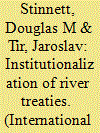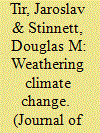| Srl | Item |
| 1 |
ID:
088928


|
|
|
|
|
| Publication |
2009.
|
| Summary/Abstract |
This article seeks to expand our understanding of why states use international institutions to manage transboundary rivers. Agreements governing the use and management of international rivers can contain a variety of different institutional features. We address the question of why riparian states choose to include or exclude these features from river treaties. Our explanation focuses on the problem of securing post-agreement compliance. Institutions perform a variety of functions that help states maintain cooperation over time. We analyze this explanation using a data set of river treaties formed between 1950 and 2002. We find that the institutionalization of river treaties is associated with water scarcity, the flow pattern of shared rivers, trade interdependence, and the level of economic development. These findings have important implications for the possibility that rivers will be a source of future conflicts.
|
|
|
|
|
|
|
|
|
|
|
|
|
|
|
|
| 2 |
ID:
110815


|
|
|
|
|
| Publication |
2012.
|
| Summary/Abstract |
Although the subject remains contested, some have speculated that climate change could jeopardize international security. Climate change is likely to alter the runoff of many rivers due to changes in precipitation patterns. At the same time, climate change will likely increase the demand for river water, due to more frequent droughts and greater stress being placed on other sources of water. The resulting strain on transboundary rivers could contribute to international tensions and increase the risk of military conflict. This study nevertheless notes that the propensity for conflicts over water to escalate depends on whether the river in question is governed by a formal agreement. More specifically, the article argues that the ability of river treaties to adapt to the increase in water stress resulting from climate change will depend on their institutional design. It focuses on four specific institutional features: provisions for joint monitoring, conflict resolution, treaty enforcement, and the delegation of authority to intergovernmental organizations. Treaties that contain more of these features are expected to better manage conflicts caused by water stress. This expectation is tested by analyzing historical data on water availability and the occurrence of militarized conflict between signatories of river treaties, 1950-2000. The empirical results reveal that water scarcity does increase the risk of military conflict, but that this risk is offset by institutionalized agreements. These results provide evidence, albeit indirect, that the presence of international institutions can be an important means of adapting to the security consequences of climate change by playing an intervening role between climate change and international conflict.
|
|
|
|
|
|
|
|
|
|
|
|
|
|
|
|